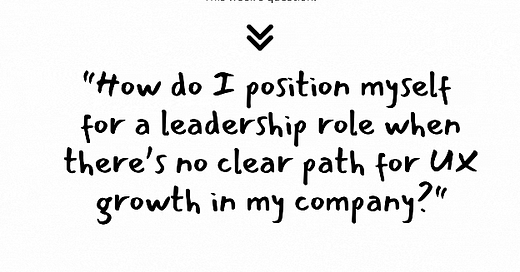🕵🏻♀️ The Unofficial Path to UX Leadership
Why waiting for a promotion might be holding you back (and what to do instead)
👋 Happy Saturday, my dear UX friends, Marina here!
Today, I want to address a challenge that would probably resonate with many UXers. Here's a message I received from one of our community members:
"Hi! I'm a Senior UX Designer at a mid-sized tech company where I've been for almost three years. I love the product we're building and my team is great, but I'm starting to feel stuck. While I'm ready to move into a leadership role, there's no clear path for UX growth here. We have a flat structure, and our design team is relatively small (just 4 designers).
My manager appreciates my work, but when I brought up career progression, they mainly talked about becoming a better individual contributor.
I know I want to lead and shape product strategy, but I'm not sure how to make that transition when there's no formal leadership track. Should I look for opportunities elsewhere, or is there a way to grow into leadership from where I am?
Any guidance would mean the world to me!"
This person’s situation highlights a very common predicament in our field: the desire to grow into leadership when there's no obvious path forward.
This challenge is particularly prevalent in smaller companies or organizations where UX is still maturing.
But here's the truth that took me years to learn:
Leadership isn't a position—it's a practice.
Let me share a framework I call "The Invisible Leader's Playbook" that has helped many of my mentees create their own path to leadership, even in organizations without formal UX leadership tracks.
The Core Principle:
Lead Before You're Leading
The secret to transitioning into leadership isn't waiting for a title
It's embodying leadership qualities before you have the formal role.
I bet, you knew that ;)
This approach creates a natural gravity that pulls opportunities toward you.
Let's break this down into 4️⃣ actionable strategies ↴
1. The Sphere of Influence Strategy
Start by mapping and gradually expanding your influence within the organization.
Here's how:
Build a "Leadership Experience Portfolio" by volunteering to lead initiatives that nobody owns yet.
Look for gaps in processes, documentation, or team coordination.
Create and maintain a UX practice playbook for your team.
Document best practices, processes, and learnings.
This becomes a valuable resource and positions you as a knowledge leader.




